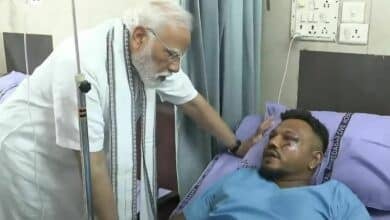World News
World news, global politics, business, technology, and culture—stay updated with breaking stories, international trends, and major events. Get the latest from The Thaiger, your trusted source for global news.
-
 Sponsored
Sponsored Is private health insurance in Thailand worth it? Real costs vs risks explained
Thailand has a strong healthcare system with both public and private options. Public hospitals offer affordable care, but many people, including expats, choose private health insurance for faster service, modern facilities, and more treatment choices. To decide if private health...
-

Broke British dad busted smuggling £100k cannabis from Thailand
A cash-strapped dad who feared for his life tried to smuggle £100,000-worth (around 4.47 million baht) of cannabis from Thailand — but his secret haul was busted by airport officers. Jason Horne, a 24 year old dad from Rycroft Avenue, Dringhouses in York, northeast England, narrowly avoided an immediate prison sentence after admitting he tried to import huge quantities of…
-

India’s growth to boost Southeast Asia’s aviation market
India’s significant economic expansion is anticipated to bolster Southeast Asia’s aviation market, including Thailand’s aviation sector, as noted by the Indian airline IndiGo, which intends to introduce its new business class seating to Bangkok and Phuket. IndiGo Chief Executive Pieter Elbers highlighted that whenever new Southeast Asian destinations are launched or route capacities increased, there is a notable surge in…
-

Cambodia accused of mislabelling rice as Thai jasmine in China
Cambodia has been accused of falsely labelling its rice as Thai jasmine rice and selling it in China, prompting the Thai Ministry of Commerce to act swiftly. Yesterday, June 27, Sunanta Kangvalkulkij, director-general of the Department of International Trade Promotion, revealed that reports from Thai nationals in China indicated Cambodian rice was being sold in Chinese supermarkets with packaging displaying…
-

Thai Airways takes off for charity in Oslo celebration
Thai Airways stepped up to support a high-profile charity walk-run in Oslo, Norway, combining fitness, friendship, and fundraising in a celebration of diplomatic history. On Sunday, June 22, the streets of Oslo came alive as Thai Airways joined the Royal Thai Embassy in Oslo and the Faculty of Medicine Siriraj Hospital to mark 120 years of Thai-Norwegian relations with a…
-

Thai student attacked in New York, transport staff criticised
A 26 year old Thai student and aspiring model was attacked and robbed in New York, prompting concerns about the lack of assistance from Metropolitan Transportation Authority (MTA) staff. She was forced to flag down a vehicle to seek help from police. A Facebook user shared details of the incident today, June 27, highlighting a warning for Thai nationals to…
-

Woman caught smuggling exotic food from Thailand into Australia
In a daring attempt to smuggle over 62,000kg of exotic foods into Australia, a woman has landed herself behind bars after her plan to flood the Sydney black market with illegal goods was thwarted by vigilant border agents. The woman, who tried to import a variety of goods from Thailand, used mislabelled polystyrene boxes to ship the products. Inside, agents found a disturbing range of items,…
-

Bangkok Airways cancels flights to Lampang and Mae Hong Son
Bangkok Airways announced the temporary suspension of its flights between Suvarnabhumi International Airport and Lampang starting from October 26. This decision, which has left many passengers concerned, also affects the route between Bangkok and Mae Hong Son, which will be suspended from July 1. The airline revealed that the suspensions are due to fleet maintenance and commercial considerations, though it reassured passengers that alternative options would still be available. Despite the…
-

China and Thailand strengthen ties on 50th diplomatic anniversary
In a bold reaffirmation of its commitment to strengthening relations with Thailand, China’s Foreign Ministry has pledged to enhance cooperation on law enforcement and mutual growth. This comes as a nine-member Thai delegation, led by Tej Bunnag, Secretary General of the Thai Red Cross Society and former foreign minister, visits Beijing to mark the 50th anniversary of diplomatic ties between…
-

Vietnamese passport dreams are made of this, leaving Thailand behind
Vietnam has torn up the red tape for foreigners with local family, making it easier than ever to bag a Vietnamese passport, no lingo, no money, and no five-year wait required, leaving Thailand behind. Foreigners married to Vietnamese citizens, or with family roots in the country, can now apply for citizenship without needing to speak the language, prove they can…
-

Phuket governor’s China trip boosts cancer care and green tech
Phuket Governor Sophon Suwanarat recently led a high-profile delegation to Guangdong province, China, on a fact-finding mission to explore cutting-edge cancer treatment, modern urban development, and green technology. The visit, which aimed at boosting Phuket’s public health services and advancing its vision of becoming a smart, low-carbon city, is set to provide invaluable insights for the island’s future. On Saturday,…
-

Krabi Airport soars as 5 airlines request landing slots
Krabi Airport is rapidly becoming one of Thailand’s most exciting aviation hubs, with five international airlines applying for landing slots. The surge in interest signals a growing global confidence in the airport’s capabilities and potential as a gateway to the Andaman region. Deputy Transport Minister Manaporn Charoensri revealed that the Department of Airports (DoA) participated in the 156th International Air…
-

Air India implements temporary flight reductions and safety measures
Following the tragic loss of passengers, crew members, and individuals on the ground in the AI171 incident on June 12, Air India has made several adjustments to its operations. The airline has expressed its deepest condolences and continued support for the families affected by this devastating event. Since the tragedy, the airline has been in constant communication with the relevant…
-

Paris Air Show: Thailand and Textron join forces on fighter fleet
A high-flying deal was struck at the Paris Air Show this week as Textron Aviation Defence LLC joined forces with Thai Aviation Industries (TAI) to launch a major support programme for the Royal Thai Air Force (RTAF). In a Memorandum of Agreement (MOU) signed at the international aviation event, the two companies agreed to jointly sustain and support Thailand’s fleet…
-

Brazilian busted at Phuket Airport over traffic crimes
A holiday escape turned sour for one Brazilian man after he was nabbed by immigration cops at Phuket International Airport – wanted over traffic offences and caught just before takeoff. Phuket Airport Immigration confirmed the arrest of the 35 year old suspect on Sunday, June 15, at around 10.30am. The man, whose name was not released by police, was taken…
-

VietJet launches Bangkok-Seoul flights with 0 baht fares
Get ready to pack your bags for Seoul, as VietJet Thailand announces its first-ever direct flight route from Bangkok (Suvarnabhumi) to Seoul (Incheon), set to take off on October 1. This exciting new connection marks a major milestone for the airline, expanding its network across Asia and offering passengers a convenient, budget-friendly travel option between two of the region’s most…
-

King Power seeks duty-free contract renegotiation after setbacks
Thailand’s leading duty-free giant King Power is in talks with Airports of Thailand (AOT) to renegotiate its contracts across five major airports, after claiming external factors severely impacted business performance. The duty-free giant, known for its extensive presence in airports across the country, raised concerns about an increasingly challenging market and the financial burden of maintaining its original commitments. In response, King Power is…
-

India tragedy: Black box recovered from fatal flight
The recovery of the black box from last week’s deadly Air India crash marks a crucial step in the investigation, potentially revealing vital insights into the cause of the tragic accident. Tragedy struck last Thursday, June 12, as Air India’s London-bound flight crashed shortly after takeoff from Ahmedabad, killing at least 270 people, including most of the passengers. Now, as…
-

Thai Airways exits rehabilitation plan after four years of operation
Thai Airways (THAI) announced yesterday, June 16, that the Central Bankruptcy Court officially approved the end of its rehabilitation process. The airline now plans to seek permission to relist its shares on the stock exchange by August. THAI shared the news via its official Facebook page, stating, “The Central Bankruptcy Court has ordered the termination of business rehabilitation. THAI is…
-

Airline service charges set to rise at 6 Thai airports this October
In a move that will impact passengers at six key airports, the Department of Airports (DoA) has announced an increase in passenger service charges (PSC) for both domestic and international departures. Starting October 1, the domestic charge will rise from 50 baht to 75 baht per person, while the international charge will jump from 400 baht to 425 baht per…
-

British survivor recalls horrifying moments of Air India crash (video)
The British survivor of the devastating Air India plane crash has recounted the horrifying moments as the Boeing 787 Dreamliner plummeted into a building, killing 241 people onboard. “I thought I was dead,” Vishwash Kumar Ramesh said from his hospital bed, describing the chilling moment when he realised he had miraculously survived. The 40 year old British-Indian, who has lived…
-

Thai singer shares connection to Air India crash survivor
A Thai singer, who survived a plane crash in Surat Thani in 1998, revealed that he once sat in the same seat number as the British survivor of the recent Air India crash. The singer, Ruangsak “James” Loychusak, took to his Facebook page, Jamesruangsak, to comment on the Air India crash near Ahmedabad, India, which occurred today, June 13. In…
-

Air India flight AI171: Experts probe deadly takeoff crash (video)
A devastating crash involving Air India Flight AI171 has left 241 people dead and raised serious questions about what went wrong just moments after takeoff. The Boeing 787-8 Dreamliner, en route from Ahmedabad to London Gatwick, plunged shortly after departing Sardar Vallabhbhai Patel International Airport yesterday, June 12, just 1.5km from the runway. The tragic incident marks the first fatal…
-

Bomb threat forces emergency landing of Air India flight in Phuket
Following the Air India flight crash yesterday, a bomb threat forced another flight from the troubled airline to make an emergency landing at Phuket Airport today. Flight AI 379, en route from Phuket to Delhi with 156 passengers aboard, was diverted to Phuket after a bomb threat message was discovered on board. At 9.30am today, June 13, Phuket International Airport…
-

British man cheats death in horror Air India crash (video)
A British man has miraculously walked away from the burning wreckage of an Air India plane crash that killed at least 241 people, making him the sole known survivor in one of the deadliest aviation disasters in recent years. The lucky survivor, 38 year old Vishwashkumar Ramesh, was seated in 11A on Air India flight AI171, which crashed into a…
-

‘Screw-up’ at Suvarnabhumi: Broken bolt brings escalator to a halt
An escalator at Suvarnabhumi Airport gave travellers a fright this week when it suddenly ground to a halt — but no injuries were reported and engineers have already fixed the glitch. The malfunction occurred around 11pm on Wednesday, June 11, at an escalator linking the APM train station to the new SAT-1 terminal. A video clip of the incident quickly…
-

Air India flight to London crashes post-takeoff with 242 passengers (video)
Tragedy struck in Ahmedabad, India, this afternoon when an Air India flight bound for London Gatwick crashed just moments after takeoff. Flight AI171, carrying over 240 people, crashed into a residential area, sending a massive plume of black smoke into the sky. The airline has called the incident a “tragic accident,” and authorities are investigating the cause. The Boeing 787-8…
-

Thailand to launch direct flights to the US after aviation boost
Thailand is gearing up to reconnect with the United States through direct flight routes, as part of the government’s ambitious plans to turn the country into Southeast Asia’s aviation hub. Transport Minister Suriya Jungrungreangkit announced accelerated efforts to establish non-stop services between Thailand and the US, a move that could significantly enhance the country’s global standing. Currently, no airline offers…
-

Jetstar Asia to ground flights by end of July amid rising costs
Just a little over a year after its new route from Singapore to Krabi took flight, the Singaporean airline JetStar Asia will cease services next month. Full refunds will be offered for affected passengers. The airline, part of the Qantas Group, has struggled to cope with rising supplier costs, high airport fees, and fierce competition in the regional low-cost flight…
-

Hung out to dry! Mystery over death of Thai worker in Israel
A Thai family is crying foul after a young agricultural worker was found hanged in Israel, despite showing no signs of despair before his sudden death. Grieving relatives of 27 year old Athin “Arm” Seeluang, from Udon Thani, say they simply don’t believe he took his own life, and are calling for a full investigation into the tragedy. The alarm…
-

Thai Smile shuts down after a decade of losses
After over a decade of struggling with continuous financial losses, Thai Airways International (THAI) has officially dissolved its wholly owned subsidiary, Thai Smile Airways. The decision marks the end of the budget airline’s operations, bringing a turbulent chapter to a close. The dissolution was officially announced to the Stock Exchange of Thailand (SET) on June 5, following a resolution passed…
Broke? Find employment in Southeast Asia with JobCute Thailand and SmartJob Indonesia. Rich? Invest in real estate across Asia with FazWaz Property Group or get out on a yacht anywhere with Boatcrowd. Even book medical procedures worldwide with MyMediTravel, all powered by DB Ventures.






























